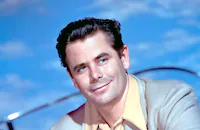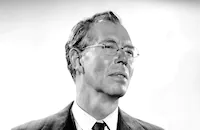The Adventures of Martin Eden
Cast & Crew
Sidney Salkow
Glenn Ford
Claire Trevor
Evelyn Keyes
Stuart Erwin
Dickie Moore
Film Details
Technical Specs

Synopsis
At a trial in San Francisco, seaman Joe Dawson is about to be sentenced for mutiny when fellow sailor Martin Eden interrupts the proceedings, claiming that he has been trying to present evidence from a diary he kept of the voyage. However, the judge refuses to listen to him and sentences Joe to ten years in prison. Martin tells Connie, Joe's sister, that he will show the diary to Amos Morley, the owner of the ship on which the mutiny took place. After Martin bursts in on a society party at the Morley mansion, Carl Brissenden, a famous author and Martin's idol, offers to read the diary and, accompanied by Morley's daughter Ruth, they go to Brissenden's study, where Martin relates his account of the voyage: He had boarded the cargo ship, The Lorelei , to find Captain "Butch" Ragan, whom he had known since childhood, in charge. Ragan's extreme brutality caused the death of Johnny, the cabin boy, and Martin began to keep a diary, documenting additional brutality, rotten food and poor conditions on board. Later a group of the sailors, led by Joe, took Ragan prisoner at gunpoint. After Martin concludes his account, Brissenden tells him that no one will believe it, but offers to send it, in novel form, to a publisher. Later, Ruth visits Martin's hotel room in Oakland to inform him that The Lorelei is in port and that her father has agreed to inspect it. When they go to the dock, however, Martin discovers that Ragan has been tipped off about the visit and everything is in order. Connie is becoming jealous of Ruth and feels that Martin, who is now trying to build himself a reputation as a writer, belongs at sea. Over dinner at a café one evening, Martin tells Connie about a new novel he is writing, which contains a romantic element. Brissenden then comes in drunk, and Martin invites him back to his hotel room, where he reads his incomplete South Seas novel to him. Brissenden thinks it is terrific and tells him that Ruth is in love with him. Martin and Ruth's relationship is rocky, however, and although he loves her, she rejects his roughness. When Ruth wants him to take a job with her father, Martin declines, as he wants to continue as a writer. They agree that he will have a year to see if he can become a successful writer, but several months later, Martin has only publishers' rejection slips to show for his efforts. The year is almost up when he receives an invitation to a dinner dance being given for Ruth by her parents. Connie, meanwhile, has become disillusioned with Martin and tells him that while he once fervently wanted to help Joe, he now only wants to be rich and famous. Despite her criticisms, she admits she sent his unfinished South Seas novel Continental Magazine and reveals that it has been accepted for serialization. In trying to collect money from another magazine that owes him money, Martin is arrested for disturbing the peace and jailed, thereby missing the party. When he is released, Connie brings him a copy of the magazine with his novel, The Girl From Moa Kaloa inside. Martin is overjoyed and tells Connie that he must skip their regular visit to Joe to go to see Ruth. However, Connie discovers that Brissenden has published Lady From Moa Kaloa under his own name in Odyssey Magazine . Ruth has also discovered this and when Martin shows her the Continental cover insisting that she now marry him, she accuses him of stealing the story from Brissenden. Although Martin swears that the reverse is true, Ruth does not believe him but is prepared to hear Brissenden's explanation. Martin confronts Brissenden, who does not remember reading his story as he was drunk. Eventually, however, Brissenden realizes that he unconsciously stole Martin's story and commits suicide. Martin wants to abandon writing but strives to restore his credibility by having Ragan attest to the truth of the events depicted in Death Wagon , the novel derived from the diary. Martin and Ragan have a brawl on board the ship and Martin is about to have Ragan write a confession, when he realizes that the ship has left harbor and he is a prisoner. Meanwhile, in Oakland, Connie is visited by the publisher of Continental Magazine , who is looking for the final chapters of the novel. Together they find the missing chapters and the publisher states that he wants to publish all of Martin's work and begins issuing Death Wagon . When the ship eventually reaches Tahiti, Ragan is fired because of Martin's book. Martin and Ragan have another fight, and after Martin beats him badly, Ragan signs a confession. Martin then returns to San Francisco, but Morley instructs his attorney to prevent Martin from presenting the confession at Joe's new trial. The attorney promises Martin that if he testifies that Death Wagon is fiction, they will arrange a pardon for Joe within a year. Although Martin meets Connie and tells her what is planned, Martin testifies at the trial that his book is all true and reads Ragan's confession. In so doing, he loses the Morleys but wins Joe's freedom, Connie and his self-respect.

Director
Sidney Salkow
Cast

Glenn Ford

Claire Trevor

Evelyn Keyes

Stuart Erwin

Dickie Moore
Ian Macdonald

Frank Conroy

Rafaela Ottiano

Pierre Watkin
Regina Wallace
Robert J. Mcdonald
C. Harry Clark
Harry Wallace
Dutch Hendrian
Ed Randolph
John Northpole
Harry Tenbrook
George Allen
Blackie Whiteford
Ethan Laidlaw
Johnny Walsh
Schuyler Standish
Heinie Conklin

Byron Foulger
George Hickman

Nestor Paiva
Joe Mcguinn

Addison Richards
Boyd Davis
Jimmy Gubitosi
Jovanny Blake
Sonny Schulman
Louis Frasco
Robert Ferrero
Sylvia Arslan

Walter Baldwin
Torben Meyer
Rudy Robles
Paul Stanton
Milton Kibbee

Charles Lane
Ferris Taylor
Arthur Loft
Martha Wentworth
Eileen O'hearn
Crew
Lionel Banks
Samuel Bronston
Al Clark
George Cooper
Werner R. Heymann
William Mull
Cary Odell
Franz F. Planer
W. L. River
B. P. Schulberg
M. W. Stoloff

Film Details
Technical Specs

Quotes
Trivia
Notes
The film's title card reads: "The Adventures of Martin Eden by Jack London." The film's working title was Martin Eden. London's novel was first serialized in Pacific Monthly (Sep 1908-September 1909). A November 1941 Hollywood Reporter news item notes that Mimi Aguglia was originally to play the role of "Marie Sylva." The Adventures of Martin Eden marked Samuel Bronston's first effort as a producer. According to a news item in Los Angeles Daily News, Bronston intially planned to produce the film with James Roosevelt, with Pat O'Brien in the title role. A Columbia publicity item contained in the AMPAS Library production file adds that Robert J. McDonald, who portrayed the judge in the picture, was Bronston's head legal counsel. London's novel was filmed twice before: by Bosworth, Inc. in 1914 as Martin Eden, directed by Hobart Bosworth and starring Lawrence Peyton (see AFI Catalog of Feature Films, 1911-20; F1.2852); and in Russia in 1918 as Creation Can't Be Bought, directed by Nikandr Turkin and starring Vladimir Mayakowsky.












